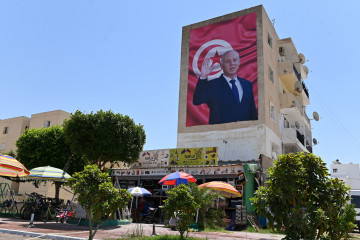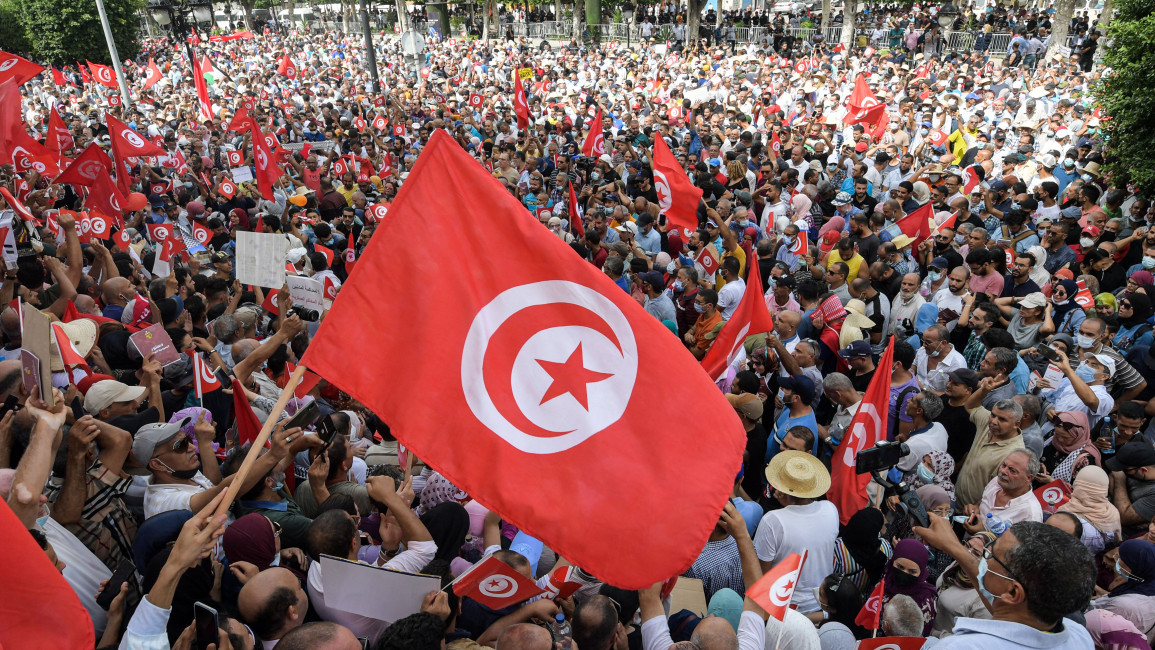

Tunisia has approved a new draft constitution that enshrines in law Kais Saied’s centralisation of sweeping powers with 94.6 percent (or some 2.6 million voters) voting in favour amid 30.5 percent turnout, according to preliminary results announced by Tunisia’s election commission ISIE on Tuesday.
Over nine million eligible voters were called to go to the ballot box on 25 July, exactly one year since Saied sacked the government and dismissed parliament in a move critics called a coup. With no minimum participation rate requirement, the constitutional draft will now become law.
On Monday, President Kais Saied called the early results of the referendum “an historic moment” as he appeared on Habib Bourguiba Avenue in front of his supporters celebrating the would-be adoption of the contentious new draft.
There has been a lot of criticism of the legitimacy of the poorly attended referendum in which voters overwhelmingly backed the modified text.
"I take it as a defeat for Kais Saied, given the low electoral participation. If a minimum voter threshold had been set, it would have invalidated the result"
Opposition groups have disputed the results and turnout figures in a vote that was under-monitored or had no observation at all at polling sites.
ISIE also revised the participation rate, raising it from 27.5%, the figure that was first released on the night of the vote.
On Monday evening, an exit poll by independent polling group Sigma Conseil showed that 92.3 percent cent of those who voted supported the new constitution.
Exit polls also suggested that voting took place with a 75 percent abstention rate, with 21 percent boycotting and 54 percent not participating for lack of interest.
Voter turnout was anticipated to be a key issue since the ballot was seen as a vote of confidence in the president.
“I take it as a defeat for Kais Saied, given the low electoral participation,” Mahdi Elleuch, an analyst and researcher at Legal Agenda, told The New Arab. “If a minimum voter threshold had been set, it would have invalidated the result today”.
He compared Monday’s plebiscite with the 2011 parliamentary election where over 4 million people voted, and the presidential runoff of 2019 which was won by Mr Saied and saw above 3.3 million voters.
With most major political parties and civil society groups calling for a boycott of the vote, many observers were expecting a low turnout. But it was relatively higher than expected, indicating that Mr Saied still enjoys some popularity nearly three years into his mandate.
Yet, popular support for the chief of state has significantly dropped as data from Insights showed: falling from 49.8 percent in August of 2021 to just 22% in May 2022.
|
|
Yet, the participation rate was much lower than the 45 percent participation in the 2019 parliamentary elections and less than half of that in the 2014 elections.
Tunisian political analyst and author Amine Snoussi made comparisons with some recent referendums in other countries where attendance was far higher, such as Uruguay in 2022 (86 percent), Chile in 2020 (51 percent) or the UK’s Brexit vote in 2016 (72 percent).
“How will Saied possibly give legitimacy to the vote with such feeble turnout when the rationale behind his actions has been about popular support?” Snoussi said.
“The president’s political project was debated, not the actual question of approving or rejecting the draft constitution. That’s why the campaign didn’t succeed in mobilising large numbers ahead of the ballot,” Snoussi added, arguing that only those who had already decided to vote 'yes', 'no', or boycott, were involved.
“There are so many who didn’t go to vote due to low motivation. The opposition could potentially reach out to those people and mobilise them in their fight against this regime moving forward”.
"Kais Saied has his own project in mind and will go ahead with it no matter what. We could see more authoritarian presidents coming next"
The proposed charter replaces the 2014 constitution, changing the country from its current hybrid parliamentary democracy to one where the president has nearly unchecked powers.
Under the new text, the president can present draft laws to parliament, approve state budgets, dissolve the parliament, name and dismiss the government without parliamentary approval, and appoint judges.
On referendum day, many Tunisians expressed full trust in the head of state and welcomed his course of action, demonstrating frustration with the post-2011 political system that brought little improvement to their lives.
In particular, many held the moderate Islamist party Ennahdha, the biggest party in the now-dissolved parliament, responsible for years of misgovernance and economic and social crisis.
“I’m going to vote yes. A lot of things didn’t work well with the past system, each of the ‘three heads’ had their different point of view,” Molk Mahwashy, a 24-year-old nurse, told The New Arab inside a polling centre in downtown Tunis.
Similarly, Kareem Jmal, 25, a shopkeeper coming out of the same voting centre, said he preferred a presidential system, and criticised the politics that emerged after the 2011 revolution that overthrew long-time dictator Zine El Abidine Ben Ali.
“I’m so tired of what we saw before..dirty people seeking money and power, not looking for the good of the country. With one man in charge, the rule will be tight but it will help us to move on”.
|
|
Sondes Ben Ashour, a 31-year-old schoolteacher in Tunis, echoed this view. “We lived through miserable times in the last ten years, with much corruption and hypocrisy, so I’m giving it a chance,” she told TNA.
Around midday, a voting centre in Ettadhamen, Tunis looked like a ghost town. "You can't tell if people are going to vote or not," the head of the polling centre's administration said after reporting 142 voters by noon.
Others were concerned about the risk of returning to authoritarian rule.
Mohamed, 41, who works at a metro station in the capital, rejected concentrating power in one man’s hands, fearing not just an autocratic drift but also the revival of a police state.
“Kais Saied has his own project in mind and will go ahead with it no matter what. We could see more authoritarian presidents coming next,” the 41-year-old told The New Arab.
At a voting venue in Menzah 1, north of Tunis, Ghazy, 31, an engineer, acknowledged he had just cast his ballot with a mix of hope and worry. He felt uneasy about the amended draft giving the Tunisian leader almost unlimited powers.
"The new charter replaces the 2014 constitution, changing the country from its current hybrid parliamentary democracy to one where the president has nearly unchecked powers"
“The fact that the chief of state has huge power and no checks on his authority, nor political responsibility, is the weakest point of this constitution,” he said.
But there was also widespread apathy as Tunisians appeared openly unbothered by the referendum.
“There’s nothing that motivates me to go to vote. It’s very unlikely that it will bring any change to Tunisian lives,” a 28-year-old accountant Fares Solani in central Tunis told TNA.
“It’s pointless, we will still be in the same situation after the vote,” Amira, 21, said just off Bourguiba Avenue. “If anything will change, it won’t be what people want”.
Besides the palpable disinterest among large segments of the population, reflected in the meagre turnout that doesn’t grant the president the strong mandate he was hoping for, what further complicates the question of legitimacy is that the referendum process was marred by a number of irregularities.
Election observers (Tunisian organisations Mourakiboun and ATIDE) were prevented from performing duties in various instances, and journalists were turned away from some polling stations. Most electoral monitors (among them EU, AU, I-Watch and the Carter Center) refused to observe the referendum altogether.
The few parties that campaigned to vote ‘no’ like Afek Tounes claimed they were blocked from holding campaign events at least twice. Mr Saied himself breached electoral silence by giving a live statement broadcasted on state TV after casting his vote to discuss the constitutional draft and anticipate the next steps he would take to implement his political project.
Five opposition parties affiliated with a national campaign to boycott the referendum alleged that Saied broke the silence period by attacking his opponents at the time of voting.
Well before the day of voting, opposition parties and several civil society groups warned against the content of the draft, saying that it was carried out within a contested framework of democratic legitimacy, inclusivity, and transparency.
"It's based on the logic of one man who holds all authority with no counter-powers, and no accountability whatsoever"
In addition, the electoral commission - one of the country’s last independent bodies - was taken over by decree in April, altering its membership and therefore undermining its independence.
“It’s the whole process imposed by Saied that’s been tainted by infractions, since the day he unilaterally declared the death of the 2014 Constitution until the referendum day,” researcher Mahdi Elleuch said, observing that on this basis the referendum can be neither credible nor democratic.
The researcher, while believing hope for Tunisian democracy is not gone, raised serious concern over a possible return to a dictatorial regime after approval of the newest charter.
“This is a project stemming from an illegitimate process that began on 25 July of last year,” he said. “It’s based on the logic of one man who holds all authority with no counter-powers, and no accountability whatsoever”.
Alessandra Bajec is a freelance journalist currently based in Tunis.
Follow her on Twitter: @AlessandraBajec





 Follow the Middle East's top stories in English at The New Arab on Google News
Follow the Middle East's top stories in English at The New Arab on Google News


